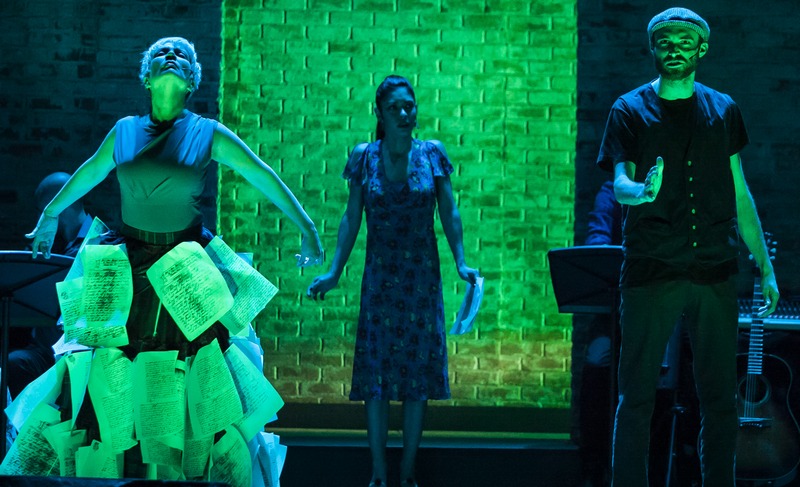Managing and Maintaining Working Capital: The Struggle for Sustainability in Today’s Non-profit World

*PHOTO: Roadside's musical play creation and production collaboration with Pregones Theater of the Bronx, NY (photo credit Marisol Diaz)
Guest post by Daryl Royse, Appalshop Financial Director
Recently, NCAR presented their Working Capital Report showing that arts organizations averaged five months of working capital. To me and others financially-inclined, this wasn’t the attention-grabbing headline that it may have been for artistic folks, since the downward decline in funding sources, the competitive environment for the ever-squeezed dollar, along with steadily-increasing expenses have taken their toll on non-profit balance sheets for years. To that end, finding ways to shore up organizational balance sheets and making the hard decisions to provide sustainable working capital within this climate is the impending challenge we face!
I’m beginning my second year as Financial Director with Appalshop, the nearly 50 year-old arts, cultural, and media organization founded in 1969, in which time I’ve learned firsthand how to manage the perpetual tidal wave of financial challenges – YES, even 50 year-old arts organizations face the same challenges as our younger counterparts. In this entry, I’ll be talking about Roadside Theater, one of the prongs of Appalshop’s multi-faceted historic programming, and also Appalshop, generally.
Specifically, I’ll give some highlights about our experience with working capital, how and why it fluctuates, how it impacts the organization, and how we are addressing the same concerns expressed in the April 2018 article, “Five Steps to Healthier Working Capital” by Rebecca Thomas and Zannie Voss.
Our experience:
Roadside Theater is the theater wing of Appalshop, and thus relies on the same funding sources as most non-profit organizations: governmental, foundational, and individual giving. As the funding landscape has changed, so too has the effort required to maintain fundraising levels. Programmatic flexibility, based on its core values, has allowed Roadside to seek out and retain funding sources. But this hasn’t always been the case, leaving Roadside, in the past, weakened and having to make critical decisions to adapt. Changes in governmental constructs, foundational positioning to fund more urban-impactful organizations and volatility from donors continues to challenge Roadside.
More recently, Roadside has benefitted greatly from overlapping multi-year grants, along with strategic expense management, which has allowed it to build cash reserves and investments, while still covering its general operating expenses. This has increased Roadside’s working capital to numerous months, providing a sustainable future for their current programmatic work. This doesn’t mean the staff is asleep at the wheel, though, as they explore their future programmatic partnerships and collaborative resources to continue fulfilling their mission.
As an extension of Appalshop, Roadside exhibits the same successes and vulnerabilities of the entire organization. Being able to respond quickly, adapting to the evolving landscape, while adhering to the mission of the organization, is the course we chart.
Impacts:
An interesting perspective on the impact to Appalshop is how we have evolved in the last twenty years. Our operating budgets and staffing are down approximately half, and now, programmatic work is often limited to fit a specific budget or fundraising construct. Over the last few years, some of Appalshop’s longest-standing and core programmatic work have faced dire financial challenges. Our capacity to produce high quality professional work, fostering it from beginning steps to full maturity, can be a struggle, which leads us to difficult decisions when exploring new work.
However, an evolving trend within Appalshop is the collaborative nature of our work and the enhanced impact we have on our region, driving the overall mission forward. This has been critical as we push the national discourse on topical issues, especially our current work surrounding Performing Our Future: The Culture Hub. Yet we still work within the paradigm of limited resources and an endowment with limited capabilities for sustaining the level of work we WANT to do.
Paths Forward:
As I read “Five Steps to Healthier Working Capital,” it rang true to our current path at Appalshop. As we approach our 50th Anniversary, we are immersed in strategic planning to push the organization forward (importantly and relevantly) for the next 50 years! We are addressing our long-term needs, and planning for them by:
1) Developing plans for increasing our endowment, while developing new protocols and flexible standards for using those funds.
2) Making the hard choices to save and invest by setting up a reserve fund for programmatic “safety nets.”
3) Creating the first long-term asset sustainability plan to address our buildings and grounds needs.
None of this is easy when we throw in the generational shifting of our staff. Yet, we challenge each other, hash out the course we want to advance, and make plans to get there. By doing so, and being upfront about the challenges we face with our donors and funders, we intend to position our finances to make us sustainable for the coming storms.
###
Daryl Royse is the Financial Director of Appalshop and has worked in both corporate and non-profit finance throughout his career.
Roadside Theater is the theater wing of Appalshop: a nonprofit multi-disciplinary arts and education institution in the heart of Appalachia producing original films, video, theater, music and spoken word recordings, radio, photography, multi-media, and books. Appalshop will be celebrating its 50th Anniversary in 2019. Visit them at www.appalshop.org or www.roadsidetheater.org